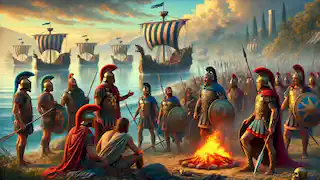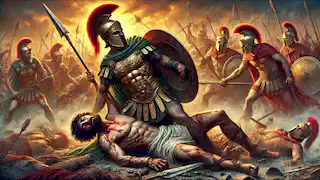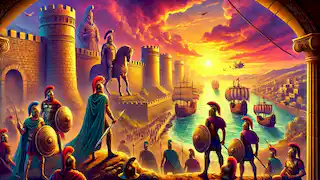The story of the Siege of Troy, immortalized in Homer’s epic Iliad, remains one of the most celebrated tales of bravery, love, and betrayal in Greek mythology. It tells of the mighty war waged over the abduction of Helen, the most beautiful woman in the world, and the dramatic end of the powerful city of Troy.
Let us embark on this journey, piecing together ancient myths, heroic exploits, and the gods’ meddling hands that shaped this iconic chapter in history. The tale begins with the wedding of Peleus and Thetis, parents of the legendary warrior Achilles. All gods were invited to the grand feast, save for Eris, the goddess of discord. Furious, Eris threw a golden apple inscribed with "To the fairest" among the goddesses. This sparked a fierce rivalry between Hera, Athena, and Aphrodite. To resolve the dispute, Zeus appointed the Trojan prince Paris to choose the fairest goddess. Each offered him bribes: Hera promised power, Athena offered wisdom, and Aphrodite tempted him with the love of the world’s most beautiful woman, Helen. Paris awarded the apple to Aphrodite, earning her favor but incurring the wrath of the other two goddesses. Thus, the seeds of the Trojan War were sown when Paris abducted Helen, the wife of Spartan King Menelaus, sparking outrage in Greece. Menelaus, seething with betrayal, called upon his brother Agamemnon and other Greek kings to avenge the insult. Among the notable leaders were the cunning Odysseus, the fierce warrior Ajax, and Achilles, a demigod with unmatched combat skills. Together, they launched a massive expedition, setting sail with a fleet of a thousand ships toward Troy. The Greeks reached Troy’s shores and began their siege. However, the Trojans, led by King Priam and his valiant sons Hector and Paris, fortified their city and prepared for the protracted conflict. The early years of the war were marked by skirmishes and strategies, but Achilles’ feud with Agamemnon became a pivotal moment. After Agamemnon seized Achilles’ war prize, the maiden Briseis, Achilles withdrew from battle, refusing to fight for the Greeks. The Trojan forces, led by Hector, took advantage of Achilles’ absence, pushing the Greeks back and gaining significant victories. Hector became a symbol of Trojan valor, while Achilles’ wrath loomed over the battlefield. Throughout the war, the gods played critical roles, often intervening in favor of their preferred sides. Athena and Hera supported the Greeks, while Apollo and Aphrodite aided the Trojans. Zeus attempted to maintain balance but was often swayed by personal grudges and divine politics. These interventions added layers of unpredictability to the conflict. Mortals faced both glory and doom as the gods influenced their fates. To rally the Greeks, Patroclus, Achilles’ closest companion, donned Achilles’ armor and led the charge. His bravery turned the tide temporarily, but Hector killed him in combat, mistaking him for Achilles. Enraged by his friend’s death, Achilles rejoined the war, determined to avenge Patroclus. His return marked a turning point as his wrath unleashed devastation upon the Trojan forces. Achilles’ thirst for revenge culminated in a dramatic duel with Hector. The Trojan prince faced Achilles courageously but was ultimately overpowered. Achilles desecrated Hector’s body, dragging it behind his chariot in a fit of fury. King Priam, heartbroken, bravely approached Achilles to beg for his son’s body. Touched by Priam’s grief, Achilles returned Hector’s body, showcasing a rare moment of humanity amidst the chaos of war. After years of stalemate, the Greeks devised a cunning plan to breach Troy’s walls. Under Odysseus’ guidance, they built a massive wooden horse, hiding their best warriors inside. The Greeks feigned retreat, leaving the horse as a “gift” to the Trojans. Despite warnings from Cassandra and the priest Laocoön, the Trojans brought the horse into their city. That night, the hidden Greeks emerged, opening Troy’s gates for their returning forces. {{{_03}}} The city was sacked, its inhabitants slain or enslaved. Troy, once a symbol of strength and resilience, fell in flames. The Greek victors faced mixed fates. Agamemnon returned home only to be murdered. Odysseus endured a decade-long journey back to Ithaca, chronicled in Homer’s Odyssey. Achilles met his end at the hands of Paris, who shot him with an arrow guided by Apollo. {{{_04}}} Helen returned to Sparta with Menelaus, her role in the war immortalized in history and myth. The gods, too, retreated to Olympus, their involvement in mortal affairs leaving a lasting legacy on the world below. The story of Troy continues to inspire literature, art, and archaeology. Its themes of love, honor, and the devastating costs of war resonate across ages. The Trojan War, though mythological, remains a testament to humanity’s enduring fascination with heroism and tragedy.The Spark of Conflict
The Greek Coalition

The Wrath of Achilles
The Gods Intervene
The Death of Patroclus

The Duel of Achilles and Hector
The Trojan Horse
The Aftermath
Legacy of the Siege

















